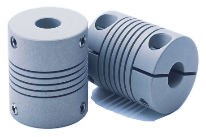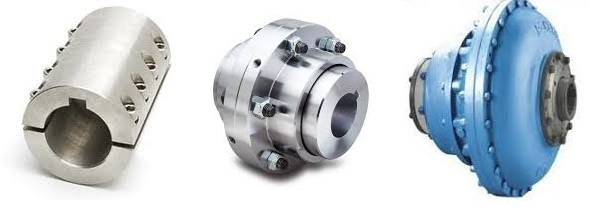Servo Motor Couplings
Introduction to Servo Motor Couplings
Servo motor couplings are essential components in mechanical systems, providing a critical connection between servo motors and driven equipment. These couplings ensure the precise transmission of torque and motion, enhancing the performance and reliability of automated systems.
Types of Servo Motor Couplings
Servo motor couplings come in various types, each designed to meet specific requirements. The most common types include jaw couplings, bellows couplings, and disc couplings. Each type offers unique characteristics, making them suitable for different applications.
Jaw Couplings
Jaw couplings consist of two hubs and an elastomeric element known as a spider. They are known for their simple design, ease of installation, and ability to dampen vibrations. Jaw couplings are widely used in servo motor applications due to their robustness and cost-effectiveness.

Bellows Couplings
Bellows couplings feature a flexible metallic bellows that provides high torsional stiffness and minimal backlash. These couplings are ideal for applications requiring high precision and repeatability, such as CNC machines and robotics.
Disc Couplings
Disc couplings use a series of thin, flexible metal discs to transmit torque. They offer excellent torsional rigidity and can accommodate misalignment. Disc couplings are commonly used in high-speed servo applications, providing reliable performance under demanding conditions.
Key Features of Servo Motor Couplings
Servo motor couplings are designed to provide various features, including high torque capacity, low backlash, and the ability to accommodate misalignment. These features ensure that servo systems operate smoothly and efficiently, even under dynamic loads.
Importance of Backlash in Servo Couplings
Backlash is the amount of play or movement in a coupling when reversing the direction of torque. Low-backlash couplings are crucial for servo systems, as they ensure precise and accurate positioning, which is essential for high-performance applications.
Material Selection for Servo Couplings
The materials used in servo motor couplings play a significant role in their performance. Common materials include steel, aluminum, and composite polymers. The choice of material depends on factors such as torque requirements, environmental conditions, and weight constraints.
Misalignment Compensation
Servo motor couplings must compensate for various types of misalignment, including angular, parallel, and axial misalignment. Proper compensation ensures that the coupling can transmit torque efficiently while minimizing wear and tear on the connected components.
Maintenance and Longevity
Regular maintenance of servo motor couplings is essential to ensure their longevity and optimal performance. Lubrication, inspection, and alignment checks are critical maintenance tasks that help prevent premature failure and extend the service life of the couplings.
Applications of Servo Motor Couplings
Servo motor couplings are used in a wide range of applications, from industrial automation and robotics to medical devices and aerospace. Their ability to provide precise and reliable torque transmission makes them indispensable in modern engineering systems.
Challenges in Servo Coupling Selection
Selecting the right servo motor coupling can be challenging due to the variety of options available. Engineers must consider factors such as torque capacity, misalignment tolerance, and environmental conditions to make an informed choice.
Innovations in Servo Couplings
Recent innovations in servo motor couplings include the development of smart couplings with integrated sensors for real-time monitoring and diagnostics. These advancements enhance the reliability and performance of servo systems, enabling predictive maintenance and reducing downtime.
Custom Solutions for Specific Applications
In some cases, standard servo motor couplings may not meet specific application requirements. Custom coupling solutions can be designed and manufactured to address unique challenges, ensuring optimal performance and reliability.
Future Trends in Servo Motor Couplings
The future of servo motor couplings will likely see continued advancements in materials, design, and smart technology integration. These trends will drive improvements in performance, efficiency, and reliability, supporting the evolving needs of modern automation and robotics.
Conclusion
Servo motor couplings play a vital role in mechanical systems, providing precise and reliable torque transmission. With a variety of types and features available, choosing the right coupling is essential for optimizing the performance of servo systems in diverse applications.
What are the three types of coupling?

The three types of couplings are rigid couplings, flexible couplings, and fluid couplings.
1. **Rigid Couplings**:
– Rigid couplings provide a solid connection between two shafts, offering no allowance for misalignment. They are typically used in applications where precise alignment is crucial.
2. **Flexible Couplings**:
– Flexible couplings accommodate misalignment between shafts. They can absorb shocks, vibrations, and thermal expansions, making them suitable for a wide range of applications.
3. **Fluid Couplings**:
– Fluid couplings transmit torque through a hydraulic fluid. They are used in applications requiring smooth acceleration and overload protection, such as conveyor systems and automotive transmissions.
What coupling is used to connect two shafts?

To connect two shafts, various couplings can be used depending on the application requirements.
1. **Torque Requirements**:
– The coupling must handle the torque generated by the shafts. High-torque applications may require couplings with high torsional stiffness.
2. **Misalignment Tolerance**:
– The coupling should be able to accommodate any misalignment between the shafts. This includes angular, parallel, and axial misalignments.
3. **Environmental Conditions**:
– The operational environment, including temperature, humidity, and exposure to chemicals, can influence the choice of coupling material and design.
4. **Space Constraints**:
– The available space for the coupling installation must be considered. Compact designs may be required in confined spaces.
5. **Maintenance Requirements**:
– The ease of maintenance and access can influence the choice of coupling. Some couplings require regular lubrication and inspection, while others are maintenance-free.
What are the two general types of shaft couplings?
The two general types of shaft couplings are:
1. **Rigid Shaft Couplings**:
– Rigid couplings provide a fixed connection between two shafts, ensuring precise alignment. They are typically used in applications where exact shaft alignment is crucial and misalignment is minimal.
2. **Flexible Shaft Couplings**:
– Flexible couplings can accommodate misalignment and absorb shocks and vibrations. They are used in applications where shafts may experience misalignment, thermal expansion, or dynamic loads.
HZPT: Leading Manufacturer of Shaft Couplings
HZPT, located in Hangzhou, Zhejiang Province, is a modern enterprise integrating R&D, learning, production, and foreign trade. We adhere to our core values of “integrity” as our business philosophy, fostering unity, progress, and innovation. We focus on the research and innovation of coupling products, providing high-tech development, international trade, industrial investment, and a global network. Our business spans Asia, Europe, Africa, and North America, working towards becoming a globally influential international group.
We specialize in manufacturing a variety of coupling products, including gear couplings, spring pin couplings, serpentine spring couplings, universal couplings, star couplings, expansion couplings, diaphragm couplings, and tire couplings. We have a complete and scientific quality management system, our own technical development and testing departments, and hold certifications such as CQC, ISO, and CE. We provide excellent sales services and technical support to our customers. Working with over a hundred partner companies, we uphold the business philosophy of “people-oriented, customer first,” and collaborate sincerely with our customers for mutual development.

**Why Choose Our Products and Services?**
1. **High-Quality Products**:
– Our products are manufactured with high precision and quality materials, ensuring durability and superior performance.
2. **Innovative Technology**:
– We leverage the latest technologies in our manufacturing processes, providing advanced coupling solutions that meet the evolving needs of our customers.
3. **Customization Options**:
– We offer custom coupling solutions tailored to specific application requirements, ensuring optimal performance and reliability.
4. **Comprehensive Support**:
– Our technical support team is always ready to assist with product selection, installation, and maintenance, ensuring seamless integration into your systems.
5. **Global Reach**:
– With a strong presence in multiple regions, we provide timely and efficient services to our international customers, ensuring prompt delivery and support.
Contact us today to learn more about our coupling products and how we can support your business needs.